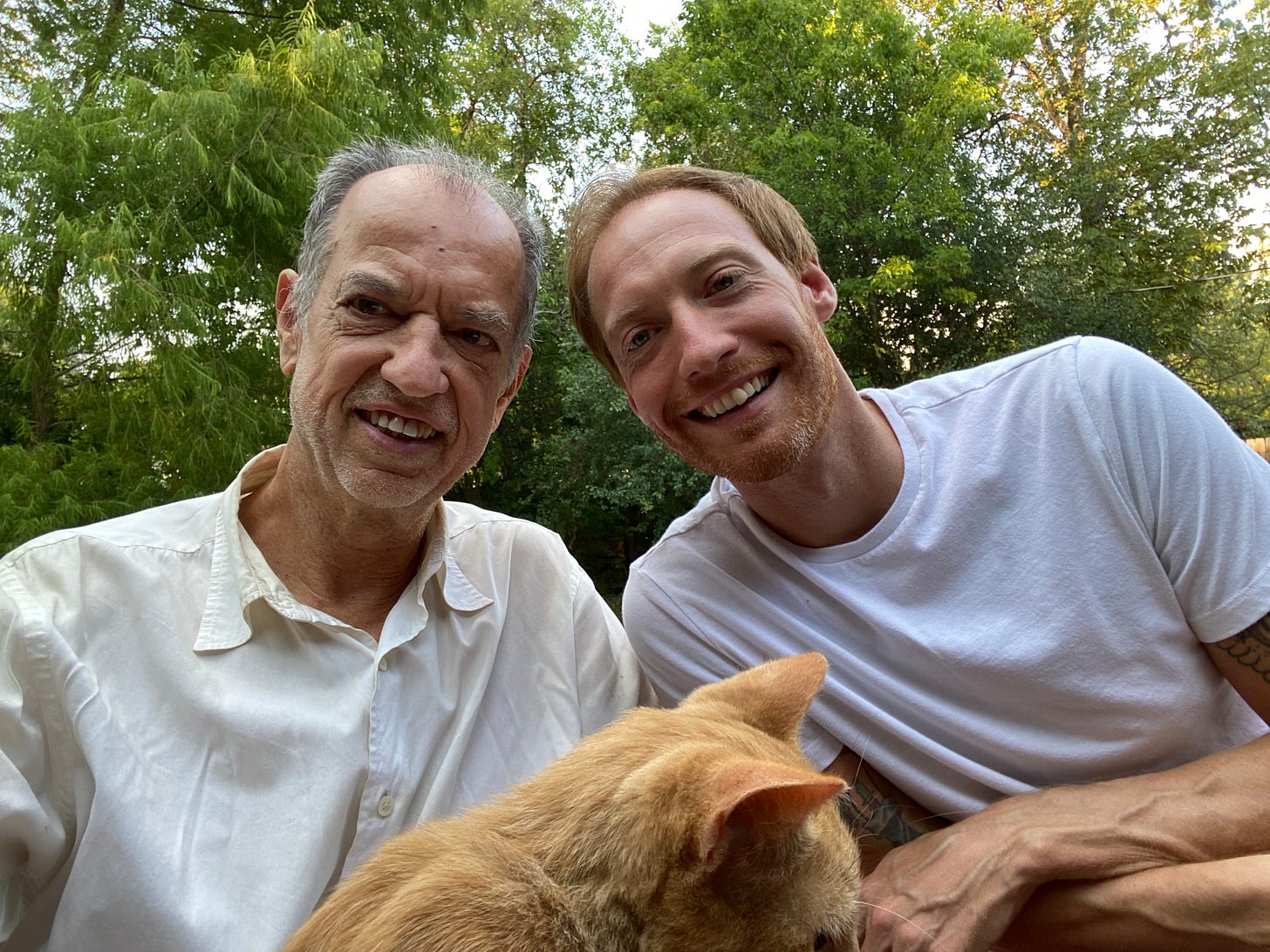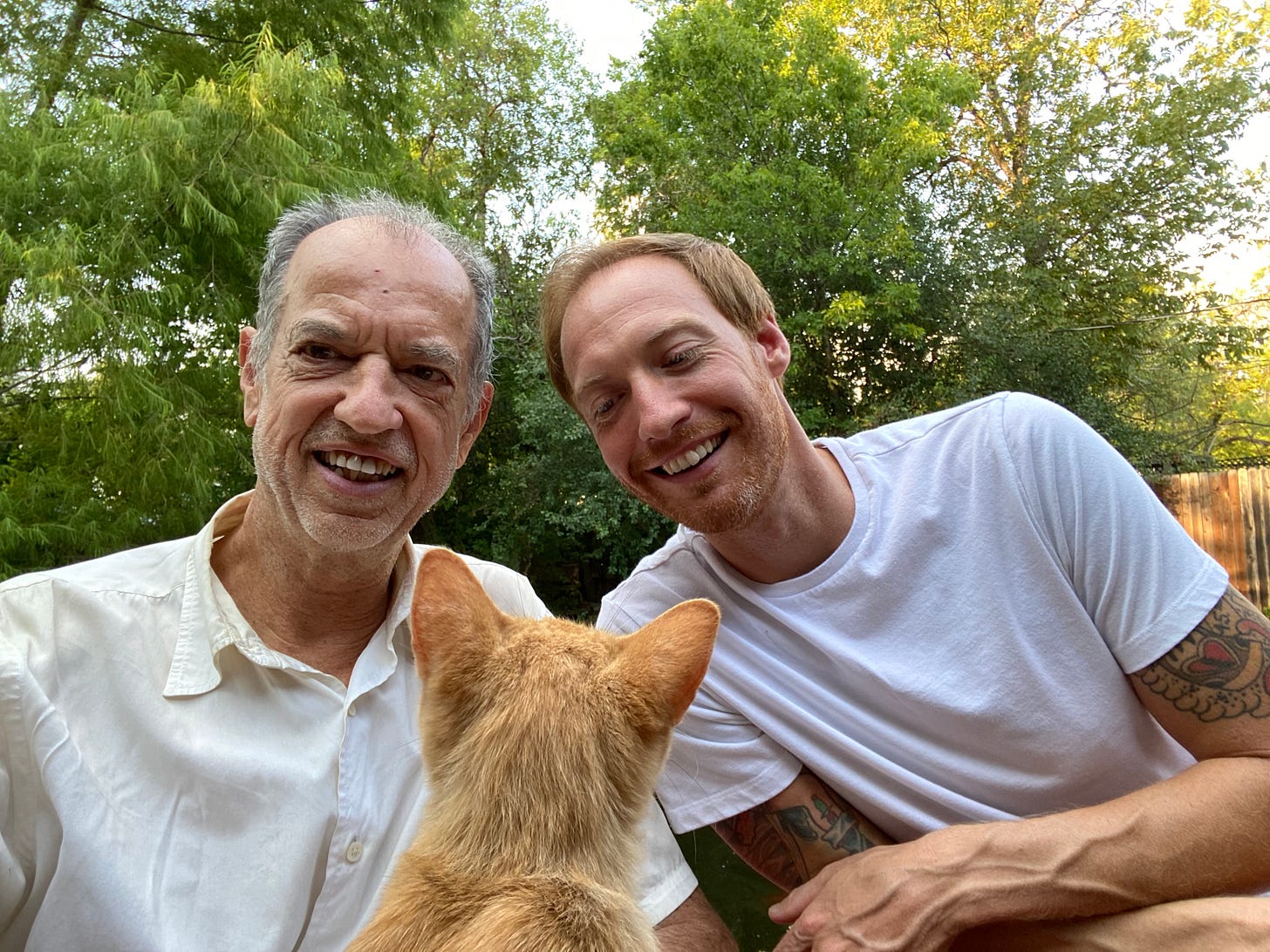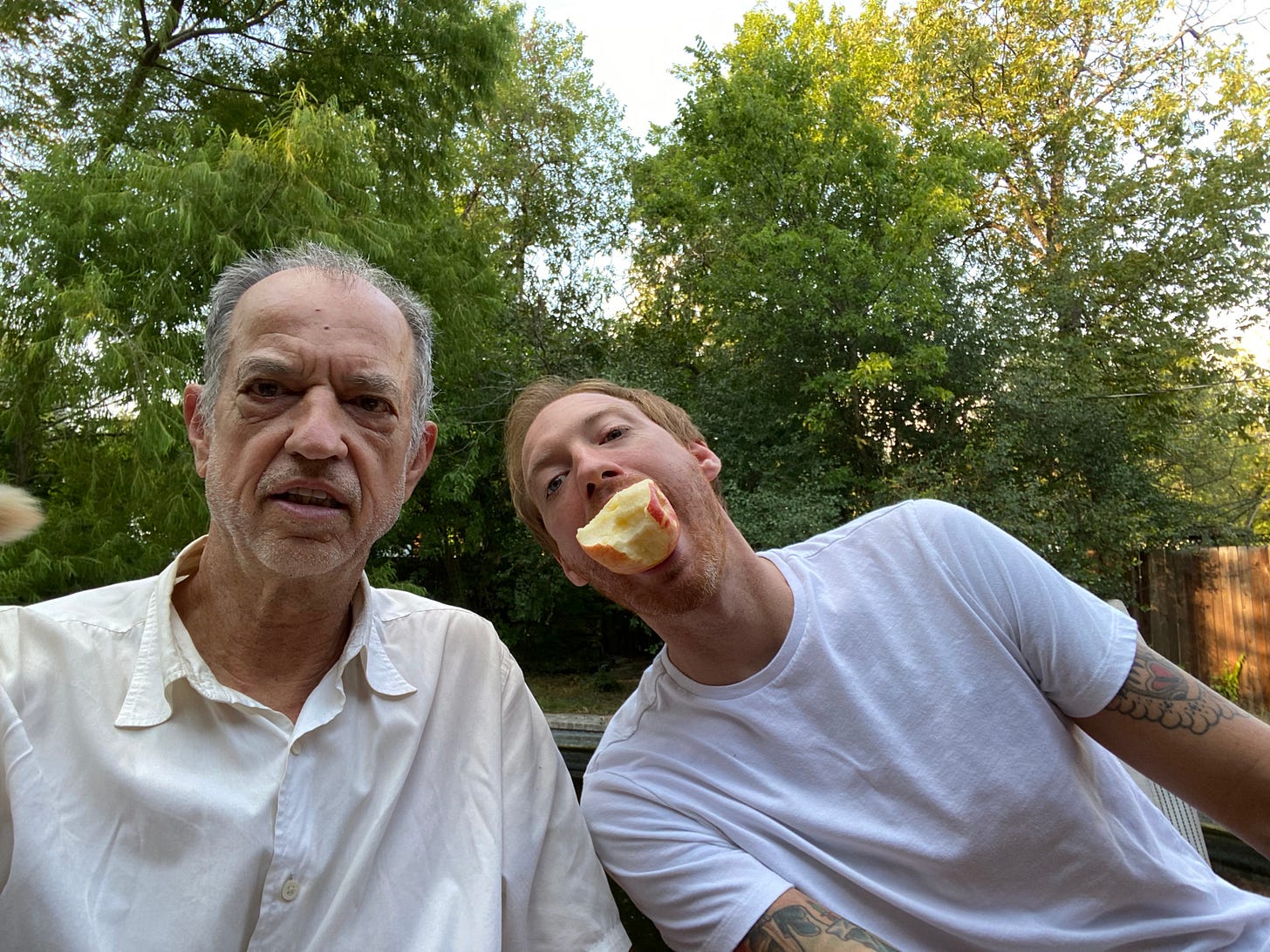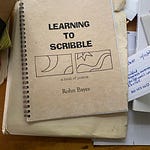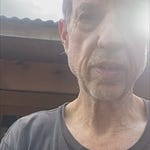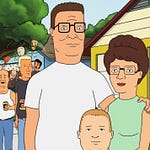Clayton and I have shared lodging for several months and I asked him if he would do an interview for the rohn report on the eve of his departure for Puerto Rico. He doesn’t necessarily consider his life to be that noteworthy but I disagree. He’s going through major transformations in lifestyle and in how he views the world and I think it’s a compelling story.
I love this guy, to be quite honest, and I see the changes he’s going through as part of a trend that many people are going through or may be going through or need to be going through. As our society evolves towards being more human based, more sustainable and less money based a lot of people will be making this journey.
Well anyways, here’s the interview.
Rohn: “Yeah, well I think that anybody’s life is interesting if you can really look at it the right way.”
Clayton: “Everyone has a story.”
R “Everyone has a story. So what’s your story.”
C “I’m living it.”
R “Ha ha ha ha.”
C “Writing it as I go.”
R “Right?”
C “It’s a shared human experience, man. We’re all here. We all have that in common. That’s my story.”
R “Yeap. Shared human experience. I like that.”
C “We’re all here and then we’re not. And then we make meaning. Try to put meaning to it.”
R “What’s it been like sharing 107 with Rohn. What’s it been like living on the Devonshire?”
C “What’s it been like?”
R “Yeah. What’s the experience been like for you?”
C “Oh it’s been great. It’s been part of my transformation. And I’ve learned a lot, gained a lot of wisdom through you and your experiences. You know, we both have different paths but I think we kinda share some of that same sentiment. And, you’re a righteous guy.”
R “Ha ha ha ha.”
C “I wish more people were like you.”
R “I feel the same about you. So like, talk about your transformation. That’s what really interests me, that’s what kind of made me think that you would be a cool person to talk to.”
C “My transformation?”
R “Yeah, you mentioned transformation, like . . .”
C “I think I’ve always felt a little, uh, displaced by society’s rules and I didn’t realize that, umh, how I didn’t fit into that mold. Pretty recently, within the past few years, just kind of a culmination of things led to this transformation of trying to live minimally and just trying to be present at all times. And I always struggled, I was always living in the future for most of my life and it took alot of practice to get to the point where I appreciate the here and the now.”
R “That’s a pretty cool transformation. What’s your, uh, being in the now what’s your plans for the future being in the now?”
C “Ha, ha, ha. Uh.”
R “Like I mean how do you see life unfolding>”
C “My future I, umh, I see life unfolding into endless possibilities because when you open yourself up to the universe or God, or the cosmos, whatever you want to call it, there’s so many opportunities that can arise that you can choose to take or not to take. I mean if you think about it every single decision in your life, it comes down to two choices, doing it or not doing it. You know, we all have the choice in the morning to get out of bed or we can stay in bed all day long. So I don’t think . . . we can all dream but I don’t know if anyone actually knows what’s going to happen. They don’t, you know, they don’t know their destiny. A part of life . . . it unfolds. That’s the beauty of it.”
R “Yeah. What if you had an Aladdin’s Lamp and you could make any wish come true. What kind of life would you like to lead. How would you visualize your life unfolding in the best possible circumstances?”
C “If I had an Aladdin’s Lamp . . . “
R “Yes! Ha, ha, ha. The genie comes out.”
C “Is it three wishes or just one?”
R “Three wishes, as many wishes . . . One wish could be, you know, that you have unlimited wishes.”
C “Is the genie Robin Williams or is it somebody else? Ha,ha.”
R “It’s a real genie, it can actually, you know, manifest . . . ”
C “He was my favorite genie, so . . . :
R “He was a genie?”
C “Well he played a genie. But he was a genie in real life too.”
R “Yeah?”
C “He was a magician. He made people laugh. Umh, I don’t think I would necessarily wish anything for myself. I don’t care much for money. Umh, I don’t really believe in it. I think I would wish for humanity to wake up and realize that money is not important. It’s very backwards how our society operates. Uh, what’s important is helping people, serving people, serving our planet, being good stewards, securing a future for all species, all . . . everything. Umh, I don’t even know if I would use the three wishes, I would just want that one thing if I could have anything in the world it would be for people to put our planet first before the profits.”
R “That’s a pretty cool response, my brother. I was just reading something about, you know, it’s not about being happy so much as it is about making other people happy.”
C “Yeah.”
R “Being happy because you’re able to bring happiness.
C “Yeah.”
R “And then the whole world, you know, is in support of . . . “
C “Exactly. Then you don’t need wars. If everybody is happy and fulfilled in sharing their resources then there’s no more need for war, there’s no more need for, uh, police, there’s no more . . . Most of the problems would be solved just by your own personal happiness. And that’s something that we talk about also on a regular basis.
R “Right.”
C “Almost on a daily basis.”
R “So you’re about to head off for, uh, Puerto Rico.”
C “Yeah.”
R “In just a few hours.”
C “Yeah. Five AM.”
R “What’s that about?”
C “Uh, living there last year for about six months working on a farm. And I got really sick and decided to come back here and heal and now that I feel like I’ve got my strength back I have an opportunity to go house sit and dog sit and so I’m just going to utilize that time to allow opportunities to happen, present themselves. I don’t really have a plan afterwards. And, like, I kind of don’t want one. It’s a little daunting but I’m just kind of leaning into that unknown because like I said before, the opportunities are endless when you just let yourself be completely open to anything. And so that’s my goal, I’m trying not to think too far into the future.”
R “It seems to me that that kind of perspective takes a lot of courage, to say you don’t know what’s going to happen in the future, you don’t have, like, a solid plan, you know, a financial framework and support system and all that stuff that most people need to build their life around. You’re saying you don’t really have that you’re just open to possibilities.”
C “Yeah, what I’ve learned is that people are there to help you when you need the help. People are very responsive and there’s good people out there. We don’t focus on that. When you go and turn on the news they’re not talking about that, they’re talking about all the chaos and doom. But if you realize that there’s people every single day, all over this planet helping one another. That’s news, that should be making headline news in my opinion. That’s what actually matters.”
R “So you’re kind of modeling yourself after Ko and Masa, the couchsurfers that came through here (laughing) on their bikes going from the kindness of strangers to the kindness of strangers (laughing).”
C “Yeah.”
R “On their journey across America.”
C “Yeah. Exactly.”
R “Those guys were so happy.”
C “Yeah. I’m just not doing it on a Walmart bike.”
R “Oh my God. So what about your, umh, you know we’ve been . . . we’ve talked alot about farming and, you know, tried to do some farming here and learn about growing your own food. What about that part of your life? ”
C “Uh, that’s something that I want to get more involved in. I wanna start . . . and that’s what I plan to do in Puerto Rico and whatever happens after, is start foraging more, start, umh, living out some of the ideals that I have. Like one of my . . . I don’t know I kind of call him a mentor, his name is Rob Greenwood and he’s living the way that I believe we should be living. His ethos is completely revolved around our planet and how we can stop being, you know, consumers and be more producers and share our resources and I just find it really incredible. And he’s out there and he’s living that and he’s also showing that through his youtube videos, on his Instagram. So he’s putting himself out there which takes, to me that takes alot of courage. So what I’m trying to do is essentially, not follow in his footsteps but kind of create my own path I guess you could say to that same outcome.”
R “So he’s kind of a minimalist, could you describe him that way?”
C “Oh for sure, yeah he, uh, kind of . . . similar to what I, how I try to live except he’s . . . except I seem to have a lot more clothes.”
R “Ha ha.”
C “ But, uh, he’s got . . . he has really nothing. He was living out of a backpack for awhile, for a long while. He rode around the world on his bicycle, on a bamboo bicycle. He lived in a little shack that he built out of just recycled material mostly. Had a compost toilet, had an outdoor kitchen, had a shower from a cistern. Just living a very simple life. What I’ve come to realize is that when you come to live that way, when you live a simple life with less, you actually have more, in my opinion. You have more abundance because you appreciate things more. When you just have a bunch of stuff and a bunch of cars and a bunch of houses you don’t . . . I don’t feel like people can appreciate that as much. But when you don’t have anything you can live according to however you want.
R “Yeah and you’re surrounded by nature typically when you’re living like that, or at least he is rather than surrounded by four walls and sheetrock and a car and a, uh, office and a city and all these accessories of civilization. You’re rich in the experience you have of your surroundings rather than being shielded from the natural world you’re exposed to it and you have to integrate, you have to respond to it.”
C “Yeah, definitely. And that’s part of why he lives that way and that’s a main reason, or at least how I want to live, is surrounded by more nature because nature is everywhere. We are nature. It’s just a way to explain the world. But I prefer to live in a more . . . and I’m more fulfilled when I’m in a more natural element, near water. It’s just how my body operates. It’s how my mind operates. And I feel so much gratitude when I’m in that environment.”
R “Well what’s your perspective or you opinion or whatever on the way that people live today, society in general, status quo lifestyle of people living on planet Earth right now?”
C “I mean everyone has their own path, you know and uh, I think for the most part most people just want to be happy, do good, not harm other people. I don’t want to be judgemental but I don’t think we are living the way we should be living. I think putting consumerism, money, greed, power at the forefront of everything is very unhealthy for our planet as well as for ourself. And I sense an awakening happening and I see changes happening all the time and so it’s very hopeful. I really . . . it’s hard to, uh, create a system that works for everyone with, what is it 8 billion people currently. So how do you have a system that not only is sustainable but how do we heal the damage that we have created on this planet with this many people that’s economically viable? I think we do that by just consuming less. If we all just make a choice to consume less and re-use, there’s tons of clothing out there, there’s tons of cars out there, there’s so much that we already have. There’s so much food that we currently have that we just throw away. Forty per cent of the food in the U.S. we throw away. Why? It doesn’t make any sense to me and so I try to make sense of it and I try to be hopeful and I try to do the best of my abilities. And if everybody does that I think we can thrive.”
R “Yeah well that’s the next question that is bubbling up in my mind. You have gone through this transformation and yet most people haven’t. So how is that going to happen on a scale large enough to make a difference in how we live as a species on this planet? How are other people going to go through . . . how did you go through this transformation? Or would you call it a transformation?”
C “Yeah, definitely it’s a transformation. I’ve always been kind of a minimalist. I remember, you know, even as a child when my parents would ask me ‘what do you want for Christmas’ and I would say ‘I don’t want anything, like nothing’ and to this day I don’t want anything. Like, I always wanted them to give money to an organization or something like that. So I think I’ve always known that I wanted to live this way. I got lost a little bit along the way but now I feel like I’m on the path that I should have taken all along. And if I can do it, if people like Rob Greenwood and there’s a ton of examples, uh, celebrities and . . . it has to become mainstream. Which is a good thing. Like the counterculture has become mainstream and that’s good because that also forces corporation’s hands to start acting accordingly and to stop this perpetual growth.”
R “Yeah, well we live in a neighborhood here, a very nice neighborhood in San Antonio where maybe 1 out of 100 neighbors feel the way you do.”
C “I think it’s more than that. (laughs) You can tell by their yards and the cars people drive . . . ”
R “Yeah, that’s 1 out of 100.”
C “I think there’s a lot of people that, uh . . . and there’s instances all over the world, not just in the neighborhood, there is . . . I was watching a video today on like indigenous . . . the Lakota Nation. How they’re trying to get back to their roots of farming.”
R “Ah.”
C “And using those ancient practices that people have been using for thousands of years. That’s vital. That is important to pass on to people. And you can do that in the city as well. It doesn’t have to be in a rural area. You can do . . . you can grow food everywhere. Look at how many lawns are just on this one street. They’re pointless, they’re just extracting resources but if you replace that with . . . some of it, even just a portion of it with an edible landscape then we’ll have an abundance of food that we can just share with people. Like I keep hearing about food shortages. There’s no such thing as a food shortage, it’s a knowledge shortage. It’s a resource shortage, so we need to get some of these, some of the access to people who don’t have it. We need to help them so that they can grow food and feed their families.”
R “Well you’re right. Home gardens and community gardens are a trending thing.”
C “Yeah.”
R “Even in our neighborhood you see people growing things in their front yard, in their backyards.”
C “Yeah. It’s beautiful.”
R “And I guess that is the beginning of a transformation like you’re talking about.”
C “Yeah. And then it also needs . . . it’s the city, the local officials need to be onboard as well and stop fining people for doing that and why would you fine someone for just growing food so they can feed themselves? That doesn’t make any sense to me. And there needs to be more funding for local community gardens.”
R “Yeah. Then you’re not only growing your own food organically, locally to where you can grow a tomato or a peach or whatever until it’s actually ripe and then pick it instead of growing it in California or Mexico and picking it green and shipping it thousands of miles and sometimes across oceans . . . “
C “Exactly.”
R “. . . to show up on your grocery store shelf which is also part of the problem of being non-sustainable that we waste so much energy growing and transporting food.”
C “Oh yeah, for sure.”
R “. . . that it, you know, it’s really, it’s an out of balance equation.”
C “It is definitely out of balance and it’s backwards but the beauty is that all of the problems that we have in this world, the solution for every single one of them . . . there’s not a problem that we can’t solve. And especially as human beings what we’ve accomplished and what we’re trying to do . . . if we just put our energy and our resources into that, into fixing the problems that are important then everything will be perfectly fine.”
R “That’s a beautiful thing you just said, that there’s a solution for every problem. You don’t hear that every day and just to say that and to hear that is just like a really cool thing.”
C “Yeah it’s true.”
R “Yeah if you think about it logically of course it’s true.”
C “Yeah.”
R “Every problem has a solution, every question has an answer.”
C “Yeah.”
R “And it creates a positive environment rather than the current negative, divisive, uh, sarcastic, cynical environment that we live in where solutions are almost a ridiculous idea.”
C “Yeah. (laughs) Exactly.”
R “Like, oh you naive fool you think there’s a solution? No. There’s just problems.”
C “I mean that’s why it has to come from a grass roots level because people can sit there and bicker all day long about the problems that we have in this world and not get anywhere we need to come from this ‘us’, this ‘everyone’, consumers, where we’re spending our money. Buying locally instead of shipping our food in from other countries.”
R “You’re talking about living more consciously basically.”
C “Oh yeah, definitely. And it was, I think it was Winston Churchill who said, ‘a pessimist sees the difficulty in every opportunity, an optimist sees the opportunity in every difficulty’ and I’m trying to live . . . I don’t buy that, that, uh, ethos.”
R “So you’re going off to Puerto Rico in a few hours. You just gonna be hanging out, pretty much . . .”
C (laughs)
R “. . . just letting life come to you?”
C “In a way.” (laughs)
R “Hanging out on the beach, surfing.”
C “ Yeah, in a way . . . “
R “Swimming.“
C “I’m taking this time to appreciate life because that’s what it’s about, right? It’s not about working and socking away money. Money doesn’t exist. The things that exist to me are the ocean, the rivers, the clouds, the sky, the trees. You know, those are the things that are important to me. Making money is not very important and something that I’ve . . . it is challenging to kind of be comfortable with not having like a revenue stream and just figuring it out as you go but I’ve also learned that . . . that for me . . . those were some of the best times.”
R “So honestly tell me, do you feel excited or intimidated by the future, you know, possibilities.”
C “For me or for humanity? (laughs)”
R “For you.”
C “Oh, excited. I mean there’s a whole world out there, you never know where you might end up if you just take the opportunity, take the chance, you know. So many people tell me they wish they could be going . . . live out of a bag and my response is ‘you can, why not, who says you can’t?’. Everyone has responsibilities, some people have kids, some people have mortgage but you can simplify your life and design it to how you want to live. There’s no one who says you can’t. Except yourself. And once people realize that the possibilities are endless. (laughs)”
R “So if you wrote a book about your life, what would the title be?”
C . . . (laughs) “Umh, ‘One man’s journey in becoming nothing and gaining everything along the way’”
R “Nice.”
C “I think that would be the title if I had to . . . if I ever wrote a book.”
R “Cool, well that’s what I’m going to use for the title of our interview.”
C (laughs)
R “Put it up on the rohn report.”
C “Nice. Yeah.”
R “Put it out there, man, I get hundreds of hits.”
C “Yeah.”
R “People look at it. People recognize here’s something cool and they’ve been following it.”
C “Yeah.”
R “So we’ll add this to the collection.”
C “I hope so. I hope more people are receptive to what you’re doing and how you’re trying to impact the world and through your writing and your wisdom that you’ve gathered throughout the years.”
R “Yeah. Thank you. And, uh, it has been a pleasure sharing this house with you and this property and, you know these hours and these projects and stuff and I hope you come back and we do some more and life continues to unfold in amazing . . . “
C “Yup.”
R “. . . bountiful ways for both of us.”
C “You never know.”
R “Thank you so much for doing an interview.”
C “Yeah, I love you.”
R “Brother, you are awesome! Whoooo!”
C (laughs)
Correction: The name of Clayton’s mentor is Rob Greenfield not Rob Greenwood.




